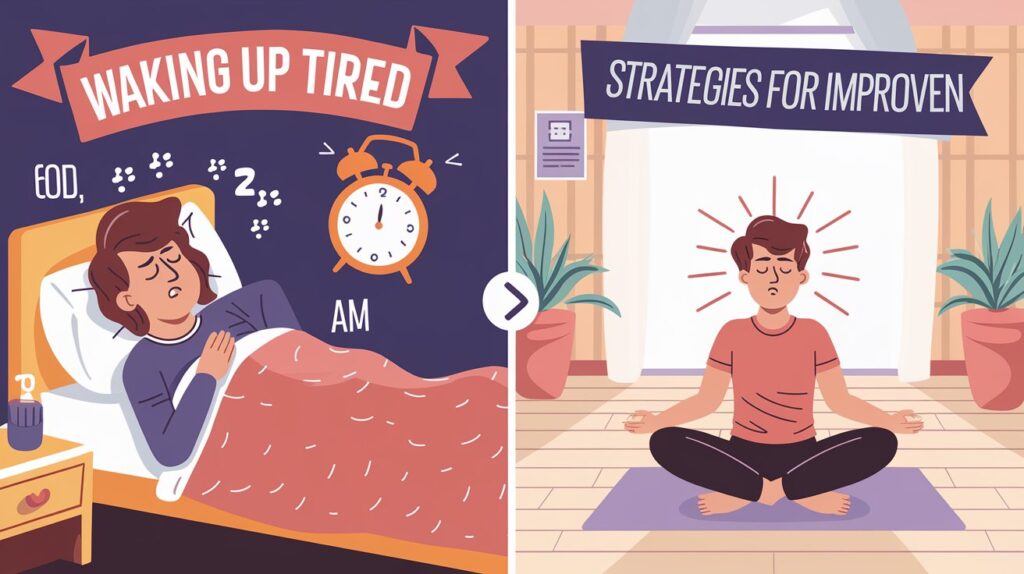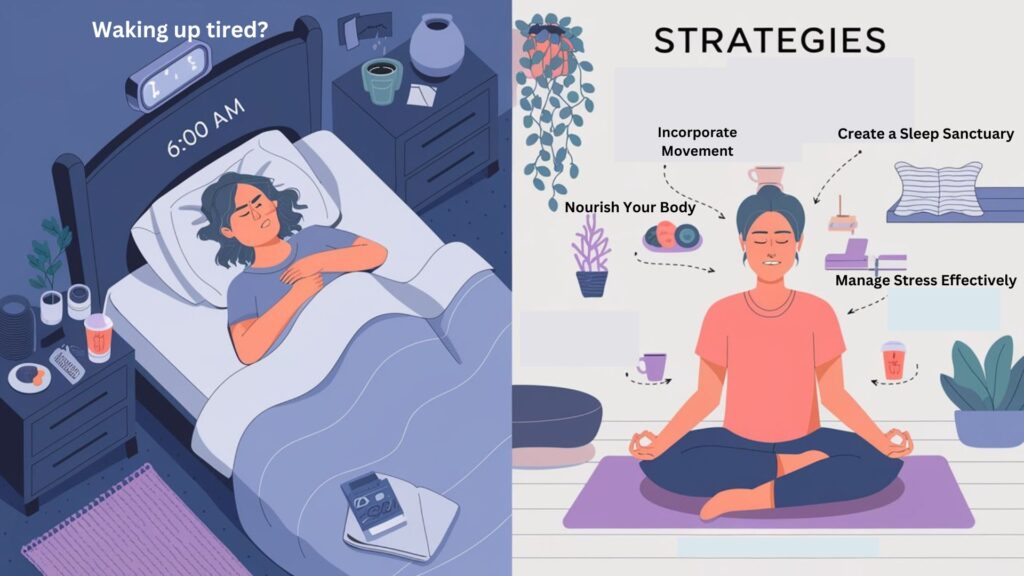Imagine this: Your alarm rings, and instead of feeling refreshed, you feel like you’ve just been hit by a truck. The day ahead seems daunting, and the thought of getting out of bed is exhausting. If waking up tired has become your daily routine, you’re not alone. Many people experience this frustrating phenomenon, but understanding the root causes and implementing effective strategies can help you reclaim your mornings.

The Science Behind Morning Fatigue
Waking up tired can stem from various factors, and understanding the science behind it can empower you to take action:

- Sleep Architecture: Sleep is not just a single phase but consists of cycles, including light sleep, deep sleep, and REM sleep. Disruptions in these cycles can lead to feeling groggy upon waking. For instance, waking up during deep sleep can leave you feeling disoriented and fatigued.
- Sleep Disorders: Conditions like sleep apnea or insomnia disrupt your natural sleep patterns. Sleep apnea, for example, causes intermittent breathing pauses during sleep, leading to fragmented rest and excessive daytime fatigue.
- Cortisol Levels: Cortisol, the stress hormone, peaks in the morning to help you wake up. However, chronic stress can lead to dysregulated cortisol levels, causing you to wake up feeling drained rather than energized.
- Physical and Mental Health: Chronic fatigue can be linked to various health conditions, including depression, anxiety, and thyroid issues. These conditions can sap your energy levels, making mornings particularly tough.
- Lifestyle Choices: Poor diet, lack of exercise, and excessive caffeine or alcohol consumption can exacerbate feelings of fatigue. A sedentary lifestyle can hinder the quality of your sleep, and unhealthy eating habits can lead to sluggishness.
Transforming Your Mornings: Effective Strategies
Now that we’ve explored the “why,” let’s focus on the “how.” Here are actionable steps to help you wake up refreshed and ready to conquer the day:

- Establish a Sleep Sanctuary:
- Optimize Your Environment: Your bedroom should be a peaceful retreat. Invest in blackout curtains to eliminate light, use earplugs or a white noise machine to drown out disruptive sounds, and set your thermostat to a cooler temperature (between 60-67°F or 15-19°C is ideal).
- Create a Sleep-Inducing Atmosphere: Use calming scents like lavender or chamomile, and consider incorporating soft lighting in the evenings to signal to your body that it’s time to wind down.
- Master the Art of Sleep Hygiene:
- Stick to a Consistent Schedule: Go to bed and wake up at the same time every day, even on weekends. This consistency helps regulate your body’s internal clock, improving your overall sleep quality.
- Limit Stimulants: Cut off caffeine at least six hours before bedtime, and limit screen time (TV, phones, computers) for at least one hour before sleeping. The blue light emitted by screens interferes with melatonin production, making it harder to fall asleep.
- Nourish Your Body:
- Eat Mindfully: A balanced diet rich in whole foods—fruits, vegetables, whole grains, and lean proteins—can help stabilize your energy levels. Avoid heavy meals before bed, as they can disrupt sleep.
- Stay Hydrated: Dehydration can lead to fatigue. Aim to drink at least 8 cups of water daily, but avoid excessive fluids close to bedtime.
- Incorporate Movement:
- Stay Active During the Day: Regular physical activity can help improve sleep quality. Aim for at least 150 minutes of moderate exercise each week, incorporating both aerobic and strength-training activities.
- Stretch Before Bed: Gentle stretching or yoga can help release tension in your body, promoting relaxation and better sleep.
- Manage Stress Effectively:
- Practice Mindfulness or Meditation: Techniques like deep breathing, meditation, or journaling can help reduce stress levels and promote a sense of calm before bed.
- Seek Support: If stress or mental health issues are overwhelming, consider speaking with a therapist or counselor for support and coping strategies.
- Monitor Your Health:
- Listen to Your Body: Keep a sleep diary to track patterns and identify any correlations between your lifestyle choices and fatigue levels.
- Consult a Healthcare Professional: If your fatigue persists despite lifestyle changes, consult a healthcare provider to rule out any underlying medical conditions or sleep disorders.

Embrace a Fresh Start
Waking up tired every day doesn’t have to be your reality. By understanding the underlying causes and implementing these strategies, you can break the cycle of fatigue and embrace each morning with renewed energy.
Consider it an investment in your well-being—one that will enhance your productivity, improve your mood, and elevate your quality of life. As you embark on this journey, remember that change takes time. Be patient with yourself, and celebrate the small victories along the way. Each morning is a new opportunity to feel your best; don’t let fatigue hold you back!